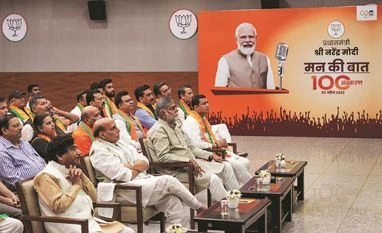Prime Minister Narendra Modi’s monthly radio programme Mann Ki Baat — which he described as an expression of the feelings of crores of Indians — went global with its 100th episode that was broadcast live at the United Nations headquarters in New York in the early hours of Sunday.
External Affairs Minister S Jaishankar joined the Indian community at another venue in the US, at Somerset in New Jersey, to listen to the radio programme that the former dubbed as the story of “New India” and a link between the country and the world.
Audrey Azoulay, director-general of the United Nations Educational, Scientific and Cultural Organisation (UNESCO), also hailed the radio broadcast, calling it one of the most celebrated, with millions of listeners in more than 50 languages and dialects.
Azoulay featured in the broadcast on Sunday and thanked Modi for the opportunity to be a part of the 100th episode.
“UNESCO and India have a long common history. We have very strong partnerships together in all areas of our mandate — education, science, culture and information — and I would like to take this opportunity today to talk about the importance of education,” Azoulay said in the broadcast.
In the 100th episode, PM Modi said the broadcast filled the “emptiness” he felt after coming to Delhi in 2014 and described it as an expression of the feelings of crores of Indians that has ensured he is never cut off from people.
The milestone broadcast was an occasion for Modi to walk down the memory lane as he asserted that it was not merely a programme but a matter of faith and spiritual journey for him.
More From This Section
Senior Bharatiya Janata Party (BJP) leaders, including Union ministers, listened to Modi’s address at different places as the ruling party went all out to make the 100th episode a mega exercise in public connect. The BJP had earlier said nearly four lakh venues would be set up for people to listen to the PM’s broadcast.
Modi said the programme is a reflection of the “mann ki baat” or the point of view of crores of Indians and an expression of their feelings. Be it “Swachh Bharat”, Khadi or “Azadi ka Amrit Mahotsav”, issues raised in the programme became people’s movements, he said.
Modi said the monthly radio broadcast, which mostly steers clear from politics, has become an important medium of learning from others. “This programme has ensured that I am never cut-off from you,” he said.
During the 100th episode, Modi also had a telephonic conversation with some people who were featured earlier on the broadcast for their unique initiatives.
Noting that the programme started on October 3, 2014, on the occasion of Vijaya Dashami, he said it has also become a unique festival of goodness and positivity of the countrymen.
Recalling that his mentor Laxmanrao Inamdar, one of the early Rashtriya Swayamsevak Sangh functionaries in Gujarat, always advised “worshipping” the good qualities of others, including rivals, Modi said Mann Ki Baat has been an exercise for him to worship the qualities in others and learning from them.
Modi said that as the Gujarat chief minister, it was natural for him to meet and interact with the common people.
“But after coming to Delhi in 2014, I found that life here was very different. The nature of the work is different, the responsibility is different, and one is bound by circumstances, the rigours of security and time limits. In the initial days, something felt different, there was an emptiness,” he said.
Fifty years ago, Modi said, he did not leave home just to find one day that it would be difficult to connect with the people of his own country. “Mann Ki Baat gave me a solution to this challenge, a way to connect with the common man,” he said.
Noting that he connected with people involved in inspiring journeys, like planting trees, cleanliness, educating the poor, for decades, he said these efforts of the countrymen have inspired him to keep striving.
Modi said, “The people whom we mention in Mann Ki Baat are all our heroes who have made this programme come alive.”
In the message from Azoulay that was part of the broadcast, the UNESCO head also enquired about India’s efforts regarding education and cultural preservation, two issues that Modi has been highlighting at the programme.
While senior BJP leaders, including Amit Shah in Mumbai, Rajnath Singh in Delhi and its national president J P Nadda in Karnataka, joined people, chief ministers of the party-ruled states and governors were joined by eminent citizens at their official residences during the programme.
The Congress, however, took a swipe at Modi, saying the occasion of the 100th episode was heralded with great fanfare but it was “maun ki baat (silence)” on critical issues such as China, Adani, increasing economic inequalities and the protest by wrestlers in New Delhi.
)